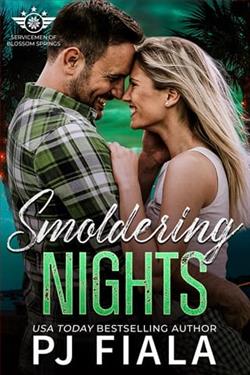Page 1 of A Ballad of Phantoms and Hope
1
Lanston
“Do not cry,”my father would say, calloused and hollow. “I’ll hit you harder if you fucking cry. Until you bleed, if I must.”
I was being punished for drawing again. My father despised art, said it created foolish minds and derisory souls. He hated me with every fiber of his being—I knew it since I was six. He’d spit at me, glare, and say things and words I didn’t yet understand.
But I understood the emotion behind it—the loathing that spilled from his shoulders, the way he carried himself like he could strike me at any moment. I knew the dog was more cherished than me.
The dog received compliments, pets, and delights, while I received bruises and welts from clothes hangers and shower heads. That didn’t start until I was eight, when I became more outspoken about the injustice of his treatment. It only made him angrier, my awareness of his cruelty.
Though I knew he didn’t like me, God, did I try my best to change his mind. I wish I had known then that nothing would’ve worked.
I tightened my jaw the best I could and hid away in my mind, thinking of baseball and quiet places I could sneak off to once this was done. It was the only thing that worked so I didn’t break down mentally like I had last time. There was no fighting this fate.
Whack.
The back of my skull was racked with pain. I bit my lower lip, keeping the tears safely tucked away with my sheer will alone. I knew if I cried, it would be so much worse.
Whack. Whack. Whack. Whack. Whack.
I sat slouched in the tub, arms wrapped securely around my knees, waiting patiently for the pain to subside. But he seemed particularly enraged that day, and I had lost count of the blows from the shower head.
His breath was heavy when he finished, and he didn't utter a word as he left.
I remained still for a while, letting my mind come back to itself. The urgency to flee was intense, and I desired to be gone completely.
If Father wants me gone so desperately, why don’t I just go away?I pondered the thought while I washed the blood from the back of my head and continued to think about it as I walked to the baseball field. I thought about it for a long time.
If my existence only brings him misery, then I should go.
But only eight years old, I did not know how to flee. How to go.
As I grew, I came to understand that there are many ways to leave.
When I was sixteen, I tried to kill myself for the first time. People shamed me and said I was selfish and wanted attention.That, if I truly wanted to die, I’d put a bullet in my head. They said I was a coward.
What a nasty, distasteful thing to say to another. Giving me options and ideas? I didn’t want to put a bullet through my head. I wouldn’t destroy the only part of me I actually liked… my mind. Dark and beautiful, as my grandmother once told me.
I was scared. I wanted to leave—to be a memory. To give my father that peace he so desperately needed from my existence.
It wasn’t until much later that I actually got help. In my second year of college, a few people mentioned I should see a therapist. At first, I was offended becausethere was nothing wrong with me, I told myself.
However, the care and gentle ease with which they explained that therapy helps you understand yourself better opened the door for me. It’s there that someone told me for the first time in my life: “It’s not your fault, Lanston.”
“Which part?” I had asked.
“It’s not your fault your father abused and disliked you. Nor is it your fault that you have a mental illness.”
I cried for the rest of the session. I wept like a child because, for the first time, I felt safe to do so. The therapist wouldn’t strike me; she wouldn’t hurt me. This I knew.
When she asked me why I was crying, attempting to help me process the emotions, I couldn’t speak. I could not even think. All I could manage was to shake my head.
It wasn’t my fault?
Then, years later, I changed that thought from a question to a statement, and those words became my daily mantra.
It wasnevermy fault.















